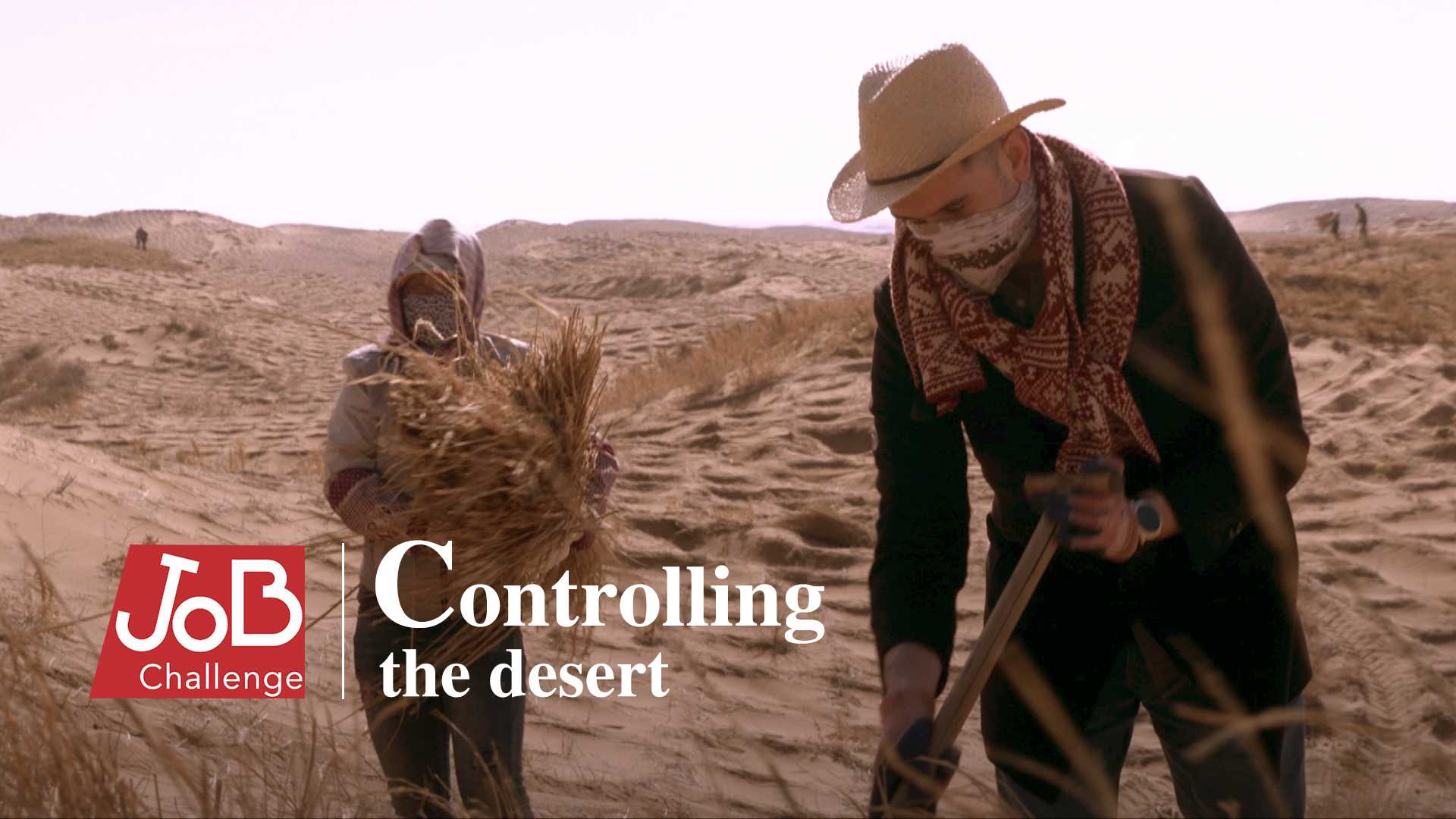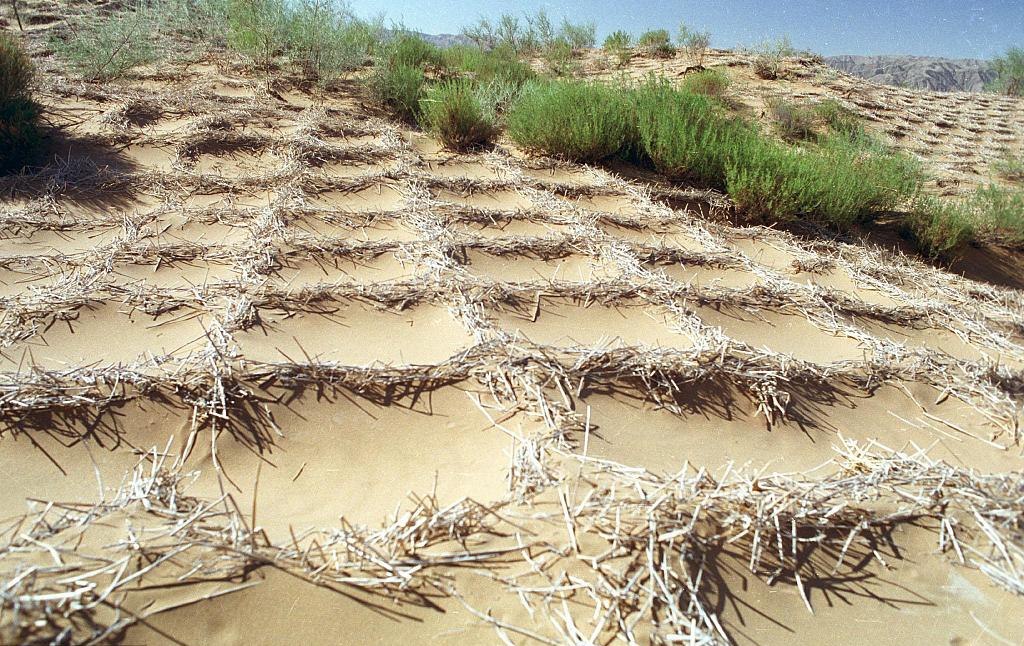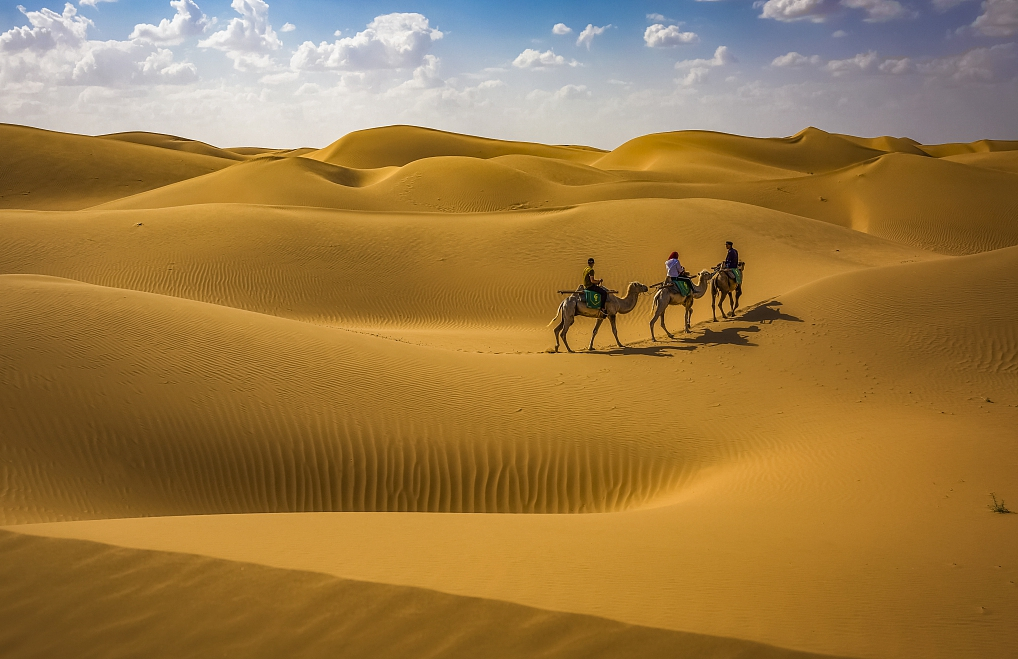
Domestic
21:24, 06-Apr-2019
Job Challenge: How China is pushing back the desert
Updated
11:29, 08-Apr-2019
CGTN
10:47

For decades, the inhabitants of Zhongwei City in northwest China's Ningxia Hui Autonomous Region watched a sea of sand ebb closer and closer to their homes, covering their streets, crops and roads, cutting them off from trade, transport and prosperity.
They were helpless against the rising tide of the Tengger Desert. Farmers were forced to leave their homes as the sand engulfed their properties.
In the 1950s, scientists and locals joined forces in perhaps the most ambitious anti-desertification project of the 20th Century.
Without any cutting-edge technology, machinery or chemicals, hundreds of people worked over the decades, turning the desert into land capable of cultivating apples and trees.
How does the checkerboard work?
How does it work? The "checkerboard" system is simple enough – dried rice stalks are laid across the ground in a one meter-by-meter square, and a shovel strikes the middle of the stalks, forcing them upright and into the ground.
This creates both a natural barrier to moving sand, and a biomass that eventually decomposes, feeding a shrub that is planted in the middle.

The checkerboards, just the first step of Zhongwei's fight against desertification. /VCG Photo
The checkerboards, just the first step of Zhongwei's fight against desertification. /VCG Photo
Five species of shrub are used, carefully chosen for their ability to survive the harsh, dry climate.
The growing shrub is the beginning of a tiny ecosystem. Eventually, other plants grow, and birds, bugs and lizards move into the area, transforming the landscape.
I arrived in Zhongwei, struggling to believe this was possible.
The city is clean and modern, the skies are clear and there doesn't really appear to be a speck of sand anywhere.
'Everything used to be desert'
Getting a taxi out of the city for just 10 minutes, the driver tells me when he was younger, this smooth, wide road was once desert. That airport I landed at? Desert. You see those shops, those hotels? Desert.

The Tengger Desert, near Zhongwei City. /VCG Photo
The Tengger Desert, near Zhongwei City. /VCG Photo
We stop at a small village, where I meet up with my co-workers for the day. A dusty MPV loaded with shovels and shy but smiling faces greets me.
I ask Ma He, my companion for the day, if I'm dressed appropriately. Slapping me on the knee, she laughs and says "no, not really."
She's 43, a mother of two and her husband is a taxi driver. She's been doing checkerboard planting for nearly eight years.
What struck me most about Ma was that she was always happy and upbeat, telling me that she's immensely proud of her environmental work. I could tell that a bigger source of pride was her two children going on to university.
Driving along a long and dusty track into the desert, I was struck by the scale of the anti-desertification project. As far as the eye could see, sand dunes appeared to be pinned in place by an enormous grass net.
Ma hands me a shovel, and we soon get to work. After a few attempts, I slowly get into a rhythm of stabbing the stalks with a shovel, sending them vertical. But it's not easy – any gaps and the sand will pass through. If too far apart, the square won't be able to support the planted shrub.
Hours pass, and the heat intensifies as my shoulders and hands ache with every strike of the shovel. It's hard to eat lunch without getting a mouthful of sand, and an exhausted afternoon nap leads to severe sunburn.
'I just played a small role'
But after meeting retired desert worker Di Changcun, how could I complain? He told me how as a 15-year-old, he first embarked into the desert to join the anti-desertification project.
Some 60 years later, he recalled how they would pitch tents on the sand at dusk, and get back to work at dawn. The heat burning the soles of their feet, the sand entering their lungs. Di told me that a lot of his colleagues died young.
But it was with genuine pride that Di described how Zhongwei had been transformed into a modern, comfortable place to live.
Di, Ma and the hundreds of other desert workers don't seek any praise for the work they did. But, as Di said, young people today must continue working hard to protect the environment.
Man cannot control nature. But this project shows that by working together with our planet we can transform it, and make it a better place.
Director: Huang Yichang
Filmed by: Fu Gaoliang, Dong Hailin, Huang Yichang
Edited by: Huang Yichang, Qi Jianqiang
Presenter: Nick Moore
Graphics and animation: Wang Li, Zhang Tao, Yu Peng, Jie Qiong
Subtitles: Zeng Ziyi, Huang Yichang
Article: Nick Moore
Project Manager: Chen Kairan
Producer: Wen Yaru
Chief Editor: Wang Dewei, Lin Dongwei, Pei Jian, Zhao Jianfu
Supervisor: Pang Xinhua

SITEMAP
Copyright © 2018 CGTN. Beijing ICP prepared NO.16065310-3
Copyright © 2018 CGTN. Beijing ICP prepared NO.16065310-3